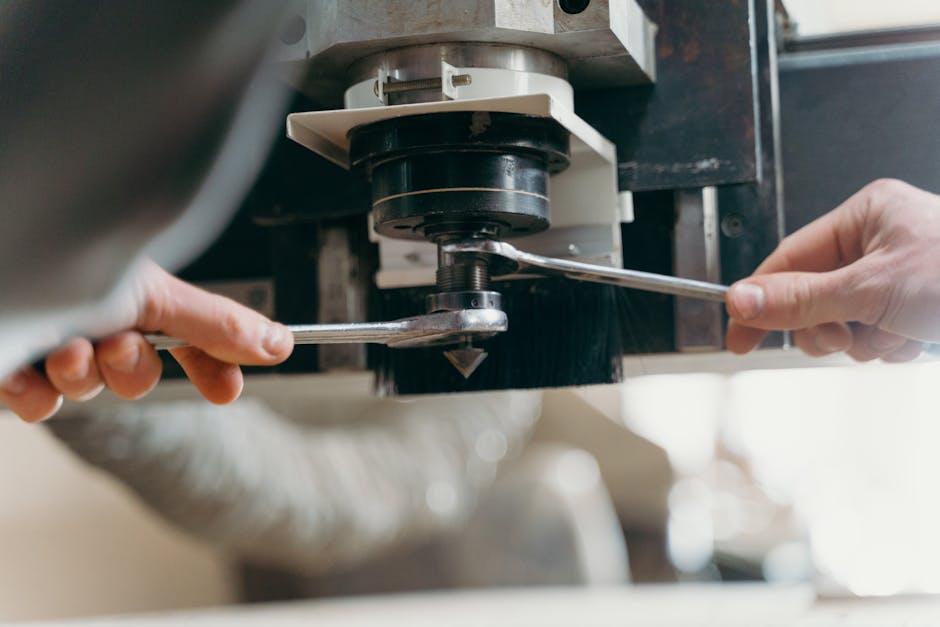Ready to discover steel machining? Feeling overwhelmed by the complexity? Well, you’re not alone. The process of turning raw steel—an incredibly durable and versatile asset—into exact, fine-tuned components for your machinery is no simple task. It not only needs expertise but also requires an understanding of the material you’re working with, and the right tools at your disposal.
Steel machining forms the cornerstone of modern manufacturing. Its potential to create resilient, tailor-made parts plays a pivotal role in powering diverse industries—from automotive to medical equipment, construction, and more. However, like every advancement in technology, steel machining comes with its own set of challenges. The one-size-fits-all rule simply doesn’t apply here. Each type of steel, from the common 1018 grade to the robust 1045, behaves differently under the blade, affecting the final product’s precision, finish, and durability.
The destination here is clear – reliable and precise steel machining that effectively boosts the performance of your machinery – but the route to get there is complex and often mired with challenges. That’s where we, the team at TMC Technologies, come in. With years of industry experience and a dedication to understanding the nitty-gritty of steel machining, we are committed to helping you navigate this tricky terrain.

To get started, here’s a quick look at some fundamental facts about steel machining:
- Manage Temperature: High temperatures ensue while machining due to the strength of steel. Managing this effectively with coolant fluids can reduce friction, support chip evacuation, and decrease tool wear.
- Minimize Vibrations: High speed machining processes can create excessive vibration, which could damage the tool and impact finish accuracy. It’s essential to mitigate this with effective workholding, tool holding, and suitable RPM among other factors.
- Choose Appropriate Tooling: Picking the right tool is not just about the material but also involves the machine, the environment, and the specific operation at hand.
Offering more than the basics, stay tuned as we delve deep into steel machining in the following sections. Unravel the nuances of different steel types, understand the process complexities, and uncover the future of this crucial element in the manufacturing industry.
Understanding the Basics of Steel
The Composition and Types of Steel
Steel, a crucial element in the manufacturing industry, is primarily composed of iron derived from iron ore. To create a versatile range of steel types, this iron ore is combined with various elements in different amounts. The result is a myriad of steel types possessing unique physical properties, tailored to meet diverse application requirements.
The properties of steel, such as strength, flexibility, formability, and hardenability, are significantly influenced by the added materials. In general, alloying elements are added in lower percentages (less than 5%) to increase strength or hardenability, or in larger percentages (over 5%) to achieve special properties, such as corrosion resistance or extreme temperature stability.
There are over 1000 variations of steel compositions, but for us at TMC Technologies, and those who need machined metal components, steels can be grouped into four basic categories — Carbon Steels, Alloy Steels, Stainless Steels, and Tool Steels. The degree of difficulty for steel machining increases as you move from one category to the next.
The Global Steel Industry and Its Major Producers
Iron ore, the main element of steel, is mined in over 50 countries worldwide. Currently, the majority of the world’s iron ore comes from Australia, Brazil, China, India, Russia, South Africa, and the Ukraine. Notably, Australia leads the pack, producing 50% more iron ore than any other country.
The Role of Alloying Elements in Steel
In the production of Alloy Steels, various elements are added to carbon steel, enhancing its physical characteristics beyond those of regular carbon steel. The properties primarily enhanced include hardness, corrosion resistance, and strength.
Here’s a snapshot of some alloying elements and their functions:
- Manganese, silicon, nickel, and copper for increased strength
- Chromium, vanadium, molybdenum, and tungsten for improved appearance
- Nickel and copper for better corrosion resistance
- Molybdenum for embrittlement resistance
- Zirconium, cerium, and calcium for increased toughness
- Lead, bismuth, selenium, and tellurium for enhanced machinability
Navigating through the complexities of steel machining can be challenging but understanding the basics of steel and its various types sets a strong foundation. As we explore further, we’ll delve into the intricacies of the steel machining process, the role of CNC in steel machining, and how different steel grades impact machinability.
The Process of Steel Machining
Steel machining is a complex yet vital process that shapes the manufacturing landscape. It involves the transformation of large steel blocks or sheets into precisely crafted components that meet exact specifications. Now, let’s explore the role of CNC in steel machining, common machining methods, and how different steel grades impact the process.
The Role of CNC in Steel Machining
Computer Numerical Control (CNC) has been a game-changer in steel machining. This highly automated system uses a computer to control the motion of specific tools, enabling the efficient and precise formation of designs from steel stock. The advantages of CNC steel machining are manifold, including speed, precision, and production efficiency. At TMC Technologies, we harness the power of CNC to deliver custom machined parts that meet your specific needs.
Common Steel Machining Methods: Milling, Turning, Drilling, and Threading
There are several steel machining methods, each with its unique applications and advantages.
-
Milling: The most common primary machining process. It uses high-speed rotating cutting tools to shape a stationary workpiece. The end result is a smooth cutting edge with high accuracy.
-
Turning: A process where a stationary cutting tool interacts with a rotating workpiece to remove material. This is typically used for machining austenitic stainless steel.
-
Drilling: This secondary machining process is used to create holes in the steel workpiece, often for screw holes, secondary assembly, or aesthetic purposes.
-
Threading: This process is used to create threads on steel parts for mounting screws and fasteners. The threads can be interior (inside a hole) or exterior (on the surface of the workpiece).
The Impact of Steel Grades on Machinability
The machinability of steel is significantly influenced by its grade. Steel grades like 4140, 4130, and 1018, each with distinct properties, can affect the machining process differently.
-
4140 Steel: This low alloy steel has good machinability and abrasion resistance, making it suitable for many industries. However, it is not the easiest to weld and may require heat treatment.
-
4130 Steel: Despite its toughness and thermal compatibility, this steel grade is not easy to weld. Yet, it’s often favored over aircraft-grade steel due to its cost-effectiveness.
-
1018 Steel: Known for its high weldability, this mild carbon steel grade is the go-to option for carburized CNC steel parts.
Selecting the right steel grade is crucial in meeting product design specifications and requirements. At TMC Technologies, we understand this and are committed to providing the best steel machining services to meet your needs.
In the next section, we’ll discuss the challenges in steel machining and how to surmount them.
Challenges in Steel Machining and How to Overcome Them
Steel machining is a complex process that involves numerous challenges. These can range from the difficulty in machining certain steel grades to managing heat sensitivity during the machining process. In this section, we’ll explore these challenges and provide some effective tips for managing them.
Difficulty in Machining Certain Steel Grades
Different steel grades have different properties, making some more challenging to machine than others. For instance, high-carbon steels, with their extreme strength and hardness, can quickly wear out tools due to the carbide-grade materials present in them. On the other hand, low-carbon alloys may cause adhesion of steel chips to the cutting tools due to their high softness, thereby shortening tool life.
To overcome these challenges, choose the right cutting tools and machining parameters. This is where our expertise at TMC Technologies comes in. We understand the unique characteristics of different steel grades and can recommend the most effective machining strategy for each one.
Heat Sensitivity and Its Management in Steel Machining
Steel machining generates high temperatures at the cut, due to steel’s strength. This heat can cause dimensional inaccuracies and tool wear. The key to managing this heat is through the use of coolant fluids, which reduce friction, aid in chip evacuation, and lessen tool wear.
Furthermore, we at TMC Technologies can adjust cutting data to minimize heat generation. Our team of experts can fine-tune variables such as cutting speed, feed rate, and depth of cut to ensure optimal machining conditions.
Tips for Effective Steel Machining
Effective steel machining requires a combination of the right tools, right techniques, and right expertise. Here are three key tips to consider:
-
Manage Vibrations: High-speed machining processes may induce excessive vibration, which could impact the finish and accuracy of the parts. Factors such as workholding, insert geometry, and tool choice can help minimize vibrations.
-
Choose Appropriate Tooling: The right tool for the job depends on the material, machine, environment, and operation. We at TMC Technologies can consult with you to select the best tools for your specific needs.
-
Minimize Heat Generation: Using coolant fluids and adjusting cutting data can help minimize heat generation, reducing tool wear and ensuring a smoother machining process.
In conclusion, while steel machining presents its set of challenges, they can be effectively managed with the right knowledge and expertise. At TMC Technologies, we’re committed to providing top-notch steel machining services that cater to your unique needs. Whether it’s choosing the right tool or managing heat effectively, our team is equipped to handle it all. In the next section, we’ll delve into the role of surface finishes in steel machining.
The Role of Surface Finishes in Steel Machining
Just as important as the machining process itself, the surface finish applied to CNC steel parts plays a crucial role in their overall performance. Not only does it enhance the appearance of the parts, but it also improves their resistance to wear and tear, corrosion, and other potential damages. Let’s take a closer look at the common surface finishes for steel parts and why they matter in steel machining.
Common Surface Finishes for Steel Parts
Steel parts can be finished in a variety of ways to improve their characteristics and lifespan. Here are some common surface finishes applicable to steel parts:
-
Powder Coating: This method involves applying a dry powder to the steel surface, creating a finish that’s typically between 0.15 and 0.3 mm thick. The primary benefit is increased resistance to corrosion.
-
Carburizing: This hardening process involves heating steel in the presence of carbon-containing materials, such as carbon monoxide and charcoal. Carburizing not only enhances the hardness but also the wear resistance of the CNC steel parts.
-
Nickel Plating: This electroplating process adds a thin layer of nickel (around 0.1 mm) to the steel, enhancing its resistance to corrosion and wear.
-
Grinding: This is a method used to smoothen the steel surface, removing irregularities. This is done using a grinding wheel.
On top of these, the aerospace industry also utilizes surface finishes such as anodizing, passivation, and polishing to enhance the durability and corrosion resistance of parts.
The Importance of Surface Finishes in Steel Machining
Surface finishes are not just for aesthetic purposes. They play a significant role in enhancing the functional performance of the machined parts. For instance, a well-applied surface finish can increase resistance to wear and tear, improve corrosion resistance, and even reduce friction in moving parts.
Furthermore, it’s important to understand that the choice of surface finish can significantly impact the component’s functionality. For instance, parts exposed to high temperatures or corrosive environments may require a specific type of finish to withstand these conditions. Therefore, knowing which surface finish to apply is crucial to ensure the longevity and reliability of the machined components.
At TMC Technologies, we understand the importance of surface finish in the overall quality and performance of machined parts. Our CNC machining processes are complemented with the appropriate surface treatments, ensuring your components meet the rigorous standards required in your respective industry.
In the next section, we’ll compare steel machining with other metals, shedding light on their unique characteristics and how they influence the machining process.
Comparing Steel Machining with Other Metals
When choosing the right metal for your manufacturing project, understanding the differences in machining between steel and other common metals can provide valuable insights. This comparison aids in selecting the material that best fits your specific application’s needs – a vital aspect we at TMC Technologies emphasize.
Steel vs Aluminum: Strength, Machinability, and Cooling Factors
Steel and aluminum are two of the most frequently machined metals, each with unique properties that can impact the machining process.
Strength and Machinability
Steel’s high tensile strength and yield strength make it a sturdy choice for parts exposed to high stress or extreme temperatures. However, this hardness also means that steel is generally more difficult to machine than aluminum. The toughness of the material can lead to increased wear on cutting tools and slower machining speeds.
On the other hand, aluminum is lighter and softer than steel, making it faster and easier to machine. It also cools more rapidly after heating, leading to shorter manufacturing cycles. Varieties like Aluminum 6061 and 7075 exhibit excellent machinability and are often used in industries like automotive and aerospace due to their balance of strength and workability.
Cooling Factors
Another important consideration when comparing steel and aluminum is their cooling behavior. As aluminum cools faster than steel after heating, it allows for a faster pace of machining, resulting in shorter manufacturing cycles.
The Machinability of Stainless Steel and Common Problems
The machinability of stainless steel can present certain challenges. Despite being a type of steel, stainless steels are generally more difficult to machine than standard carbon steel. This is due to their higher alloying content, which enhances their corrosion resistance but also makes them harder and more abrasive.
The higher the alloy content, the more challenging the stainless steel is to machine. For instance, ferritic stainless steels are among the easiest to machine. However, those with higher chromium content, like grade 446, often present difficulties, leading to increased tool wear and slower machining speeds.
In conclusion, whether choosing steel, aluminum, or stainless steel for your machining project, it’s vital to consider the specific properties, strengths, and challenges each material presents. At TMC Technologies, we’re committed to helping our clients understand these nuances to ensure the highest quality and efficiency in their manufacturing processes. In the next section, we’ll explore the future of steel machining and its impact on various industries.
The Future of Steel Machining and Its Impact on Various Industries
As we look to the future, the advancement of industrial machining technologies, such as AI and machine learning, promises to elevate steel machining to new heights. The impact of these advancements will resonate across various industries, including the medical, automotive, and electronics sectors.
The Use of Steel Parts in Medical, Automotive, and Electronics Industries
In the medical sector, precision-engineered steel components play a crucial role. From surgical tools to intricate components of medical devices, the demand for high-quality, durable steel parts is paramount. The reliability and performance of these components directly impact patient health and safety, underscoring the importance of precision in steel machining.
The automotive industry also heavily relies on steel machining. Components such as engine parts, transmission gears, and suspension systems are typically made of steel, owing to its strength and durability. The precision and consistency achieved through advanced steel machining contribute to the overall performance and longevity of vehicles.
In the electronics industry, precision-machined steel parts enhance the performance and lifespan of electronic devices. With the increasing miniaturization of electronic components, the demand for highly precise, micro-sized steel parts is on the rise. This trend underscores the importance of advanced steel machining technologies that can deliver such exacting specifications.
The Role of TMC Technologies in Advancing Steel Machining
At TMC Technologies, we’re excited about the future of steel machining. As a leading provider of CNC machining services, we’re committed to leveraging advanced technologies to deliver high-precision steel components that meet the evolving needs of our customers.
Our expertise in steel machining allows us to manufacture complex parts with staggering accuracy, making us an indispensable partner in industries where precision is non-negotiable. We’re continually refining our techniques and embracing technological advancements to enhance our capabilities and meet the growing demand for precision-engineered steel parts.
Moreover, we pride ourselves on our commitment to quality. Whether you need CNC machined parts for a medical device, a vehicle, or an electronic gadget, you can rely on us to deliver components that meet the highest quality standards.
In conclusion, the future of steel machining holds immense potential, promising to shape our industries in ways we are yet to fully comprehend. At TMC Technologies, we’re committed to staying at the forefront of these changes, harnessing our expertise to deliver top-tier, precision-engineered steel parts that power the future of various industries.
The future is bright for steel machining, and we can’t wait to see what the next chapter holds.
Conclusion: The Future of Steel Machining and Its Potential Impact on Industries
As we’ve seen, steel machining is a critical process that shapes the way we live and work. With steel’s prevalence in a wide range of applications from medical devices to automotive parts and electronics, the future of steel machining holds immense potential.
The technological advancements in steel machining, such as micro machining services, are set to significantly boost efficiency and precision. For instance, as mentioned in the research, machine learning and artificial intelligence are expected to be integrated into micro machining processes. This integration, along with the advent of automation, can enable predictive maintenance, real-time monitoring, and enhanced optimization. It’s a future where precision and efficiency are driven by technological advancements, and at TMC Technologies, we are actively participating in this revolution.
5 Axis Machining, another significant leap forward in the manufacturing sector, is also making a considerable impact. This advanced technology is transforming CNC machining, offering unparalleled precision and versatility. At TMC Technologies, we’re proud to be part of this revolution, continually expanding our ability to meet the ever-changing needs of our customers.
Furthermore, the future of steel machining is not just about technology. Despite the rise of automation, the role of skilled professionals remains vital. They are the problem solvers and innovators who navigate the complexities of modern machining tools, automation, and regulations. It’s the perfect blend of human expertise and advanced technology that will take steel machining to new heights.
However, the future also presents challenges. Not all steel parts are readily machinable, and some grades have different heat sensitivities. But with these challenges come opportunities for innovation and improvement. As we continue to push the boundaries of what’s possible in steel machining, we’re confident that we can overcome these obstacles and deliver even better results for our clients.
In conclusion, the future of steel machining is a promising one. At TMC Technologies, we’re excited to be a part of this journey, continually investing in the latest technology and training to deliver top-tier steel machining services. We look forward to a future where steel machining is even more precise, efficient, and capable than it is today.
For those eager to learn more about our services and capabilities, explore our precision machining and micro machining services. We’re here to help you navigate the future of steel machining and leverage its potential to the fullest.

The future is here, and we’re ready to embrace it. Are you?


















